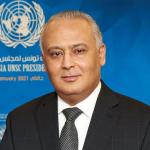The adoption of the 2030 Agenda for Sustainable Development and the Paris Agreement in 2015 established a strong foundation for coherent implementation of climate action and sustainable development objectives across all levels and sectors. In the same spirit, the Secretary-General in the address on his 2023 priorities stressed that “Climate action is the 21st century’s greatest opportunity to drive forward all the Sustainable Development Goals.”
According to WMO’s 2023 report on the Global State of Climate, the latest data show that 2023 was the warmest year on record, about 1.4°C above the pre-industrial baseline. The past nine years, from 2015 to 2023, were also the warmest on record. Global emissions continue to rise, notably after a brief decline during the COVID-19 pandemic. The latest IPCC report warns that global average temperature have already risen 1.1°C above pre-industrial levels.
The scale of finance needed is significant – global models from the most authoritative institutions all converge in the range of trillions annually. The first Needs Determination Report of the Standing Committee on Finance in 2021 shows nearly USD 6 trillion is needed to implement developing countries’ climate action plans by 2030, and this does not fully cost for adaptation. Least developed countries and small island developing states face disproportionate challenges in managing climate change and its impacts. There is an urgent need for capacity building, with a focus on women, youth and local and marginalized communities, in these vulnerable countries that are also facing debilitating debt.
This session will examine challenges and opportunities in advancing key solutions towards accelerating SDG13 as an enabler to address the interconnected crises of nature, biodiversity, pollution, but also poverty, inequality and sustainable development. The session will benefit from the outcomes of the Expert Group Meeting on the Review of the SDG 13, which took place in Tokyo in March 2024.
Proposed guiding questions:
- How has SDG 13 progressed since the 2021 HLPF review?
- What are some of the most recent successes, as well as remaining gaps, in enhancing adaptation and resilience capacities?
- How can disaster risk reduction be more effectively linked to climate and development goals in national and subnational policies for better coherence?
- What evidence-based approaches are available to leverage synergies between SDG 13 and other SDGs?
- What innovative strategies can be employed to promote climate education and awareness at the community level, ensuring accessibility and coherence across different countries and regions?
- What promising approaches can accelerate action for SDG 13 implementation, and how can stakeholders be more effectively mobilized? What is the role of science, technology, and innovation for SDG 13?
Chair:
- H.E. Mr. Tarek Ladeb, Vice President of ECOSOC (Tunisia)
Highlights:
- Findings of the report of the Secretary-General on progress towards the SDGs – SDG 13 on climate action
Ms. Heather Page, Statistics Division, DESA - Representative of Regional Commissions: Regional perspective on implementation of SDG 7 and interlinkages
Ms. Tatiana Molcean, Executive Secretary of the Economic Commission of Europe (ECE)
Interactive panel discussion
Moderator:
- Ms. Britt Groosman, Vice President of Climate-Smart Agriculture, Environmental Defense Fund
Panellists:
- Ms. Katherine Calvin, NASA’s Chief Scientist and Senior Climate Advisor, and Co-Chair of IPCC Working Group III
- Mr. Axel Schmidt Grael, Mayor, Municipality of Niterói, Brazil
- Ms. Maria Mähl, Partner, Head of USA ESG Solutions, ESG Book
Lead Discussants:
- Mr. Miquel Muñoz Cabré, Senior Scientist, Stockholm Environment Institute US
- Mr. Faisal Alfadl, Representative of Volunteers Stakholder Group (MGoS)
Interventions by ministers and other participants (up to 2-3 minutes each)
 Welcome to the United Nations
Welcome to the United Nations








